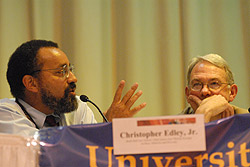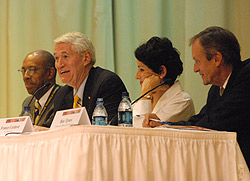Berkeleyan
Everyone into the pool?
As California's racial and ethnic diversity grows, UC's has suffered. Now, a decade after Proposition 209, some want to open up the admissions pipeline
![]()
| 01 November 2006
Ten years after California voters approved Proposition 209, there's no doubt the prohibition against using racial or ethnic preferences in UC's admissions process has widened the diversity gap between the state's high-school graduates and the student population at its most elite campuses, especially Berkeley and UCLA.
 John Oakley, right, chair of the systemwide Academic Senate, pondered a point by Boalt Hall's dean, Christopher Edley, at last week's symposium on the impacts of Proposition 209.(Peg Skorpinski photo) |
A daylong symposium last Friday, organized by the law school's Chief Justice Earl Warren Institute on Race, Ethnicity and Diversity, produced reams of evidence documenting the measure's impacts - in the form of two dozen research papers by experts in a range of disciplines including law, economics, sociology, political science, and both K-12 and higher education. Yet its focus by late afternoon had turned to what one participant termed the "tyranny of numbers" governing the way high-school students are considered for admission to UC.
Among the most rousing condemnations of Prop. 209, passed by 54 percent of the voters in November 1996, came from Berkeley Chancellor Robert Birgeneau.
"I think 209 is profoundly wrong, morally wrong," said Birgeneau, "and I personally don't think we can have a truly fair system until 209 is reversed." Birgeneau, who took part in the last of a series of panel discussions held on the Clark Kerr campus, also urged the several hundred remaining attendees to send a check to those fighting a similar measure to be voted on by Michigan voters in next Tuesday's election.
Birgeneau has been outspoken about the damage he believes Prop. 209 has done to the cause of admitting and attracting underrepresented minority students to Berkeley - a belief that seemed to be shared by the vast majority in attendance, many of whom cheered the chancellor's remarks.
But thanks to a pair of reports by educators from throughout the University of California system - and to prodding by Christopher Edley, dean of Boalt Hall School of Law - much of the discussion centered on what can be done to make the admissions process fairer to students from high schools that fail to prepare them adequately for UC's admissions process. Although Berkeley and other campuses now employ so-called "comprehensive review" to look at an applicant's entire file - considering their personal narratives as well as grade-point averages and SAT scores - only high-school students with sufficiently high GPAs and SATs make it into the pool in the first place.
"Unless we change eligibility, all we will be doing is rearranging the deck chairs," urged Patrick Hayashi, a retired UC associate president and one of 11 co-authors of a report titled "California at a Crossroads: Confronting the Looming Threat to Achievement, Access, and Equity at the University of California and Beyond."
"Eligibility and admission to UC can be remade into a more enlightened set of policies that better fulfill UC's mission of serving all Californians," asserts the report. "In part, that means apportioning the privilege of a UC education in a way that accounts for a wide range of achievements and personal characteristics, and that shuns, to the extent possible, the use of apportioning tools that are known to disadvantage large segments of the population absent strong educational justification."
The report adds: "Looking only at test scores and GPA straitjackets UC's ability to identify those [students] with the most promise."
A succession of speakers, including UC President Robert Dynes, bemoaned what Dynes called UC's "demonstrably unfair" reliance on GPAs and SATs to screen applicants, as well as the poor correlation between those metrics and success at a UC campus.
"No one but a nut makes multi-faceted human judgments" on the basis of such "artificial" factors, asserted John Oakley, a law professor at UC Davis and chair of the systemwide Academic Senate. "But we have this love affair with standardized tests."
But the consensus that the existing screening process unfairly excludes otherwise-qualified African American and Hispanic students - many of whom attend high schools that lack advanced-placement courses, testing preparation, and other advantages afforded more privileged students - did not extend to remedial action. A number of speakers called for more research, and Birgeneau, a physicist by training, even proposed an experiment.
A 'clear commitment' to diversity
Noting that Berkeley accepts about 2,000 community-college transfers annually, Birgeneau said these students' college GPAs and graduation rates are typically just as high as those of the 4,000 students accepted directly from high school. To better identify the factors that lead to success at a UC campus, he suggested, researchers should "go back in time two years" and see what the transfers' applications would have looked like had they applied directly to UC.
 At last week's symposium, Chancellors Michael Drake of Irvine, Robert Birgeneau of Berkeley, and France Cordova of Riverside - seated with UC President Robert Dynes - discussed inequities in UC's admissions process.(Peg Skorpinski photo) |
A related proposal to increase UC's slice of California's top graduating high-school seniors to 15 percent from 12.5 percent - the level mandated by the state's 1960 Master Plan for higher education - met with skepticism from Dynes, who pronounced himself "troubled" by the suggestion. In particular, he noted that the California State University system regularly fails to reach its mandated target of the top one-third of the state's seniors, largely because CSU administrators have found more "marginal students" at the outer edges of eligibility.
While further research may be needed to determine the best ways for UC to boost the diversity of its student populations - with or without Prop. 209 in place - the forum closed on an optimistic note.
Oakley, citing the "sluglike" nature of change in a large bureaucracy, said he believed the Academic Senate would welcome new findings in an effort to make UC more inclusive.
"I think the prospects are promising," he said, "because our commitment to diversity is clear, and we're not achieving that commitment today."
Said Dynes: "I heard some stimulating ideas today. I think, in my physicist mode, I haven't yet seen the data that convinces me. But I'm throwing out the challenge. I expect that this is the beginning of an ongoing set of discussions that will address the inequities. And I do believe that blaming Proposition 209 or blaming the Master Plan is passing it on inappropriately.
"I think this is our problem to solve," Dynes added, "and I think we should get on with it."

